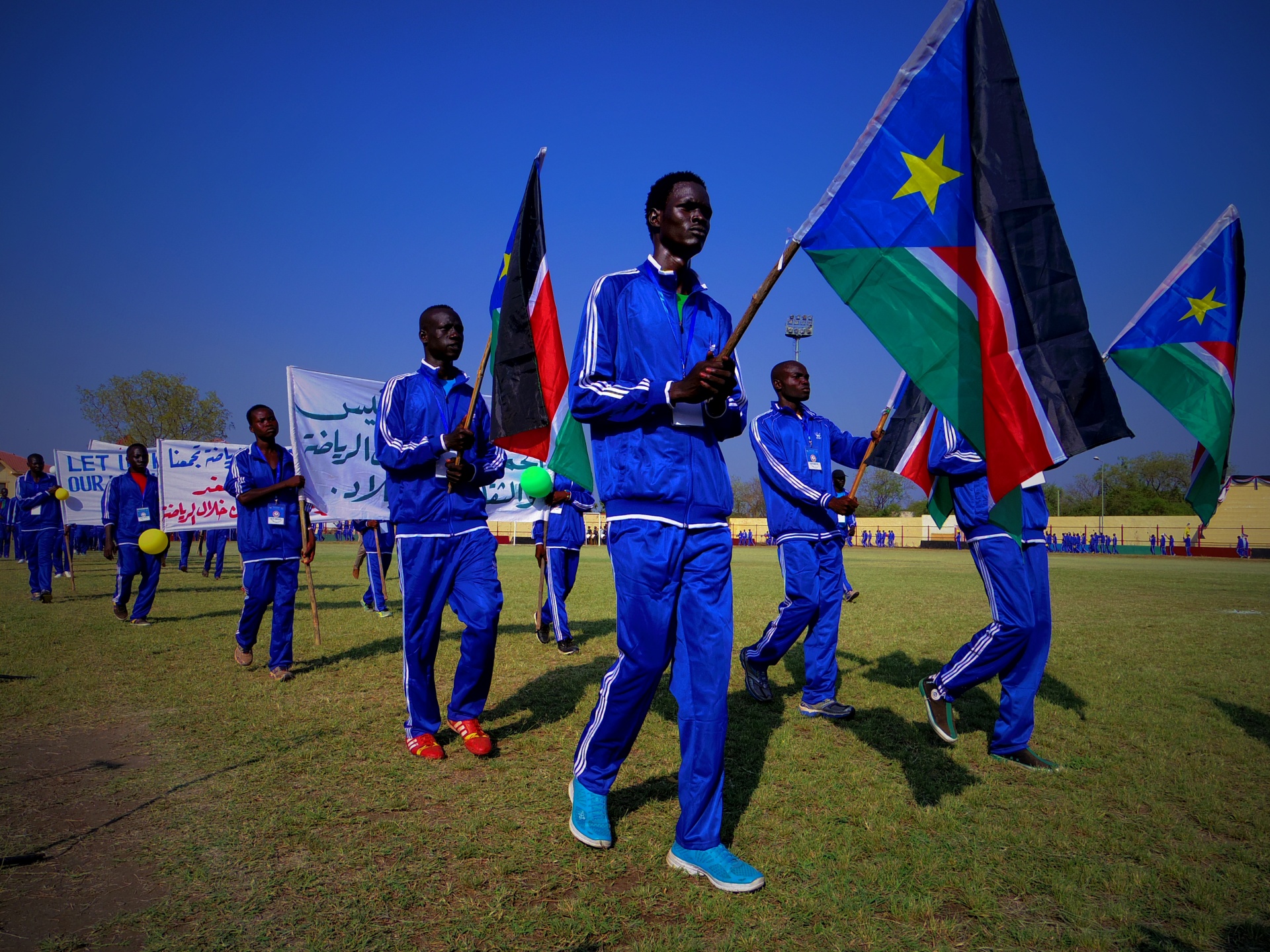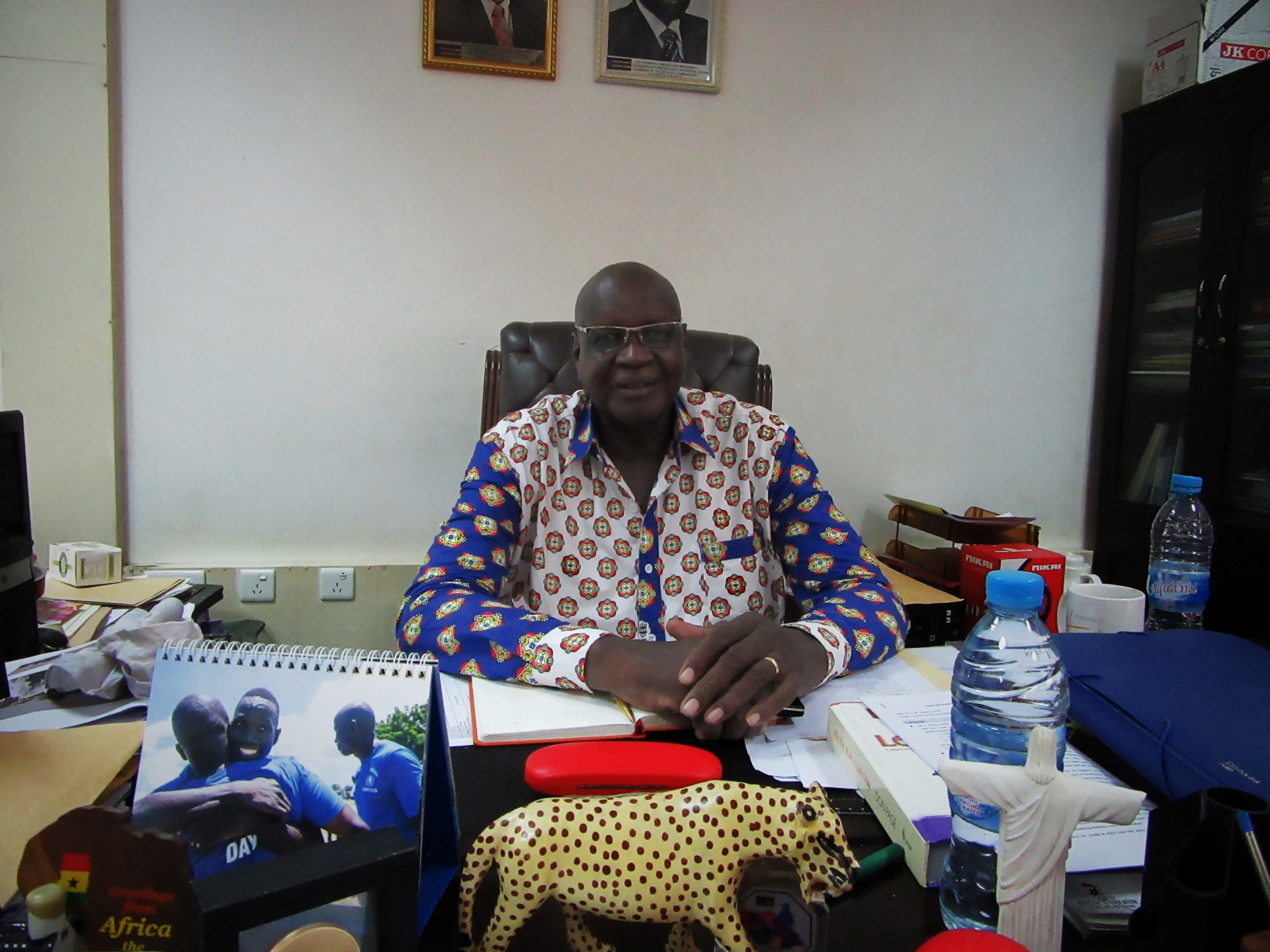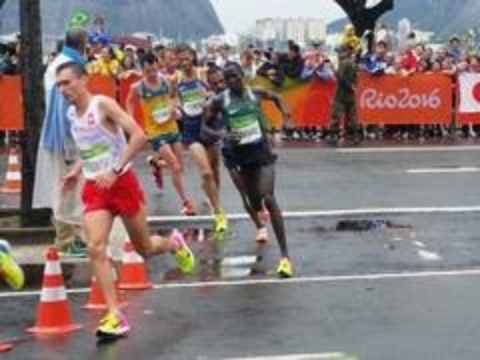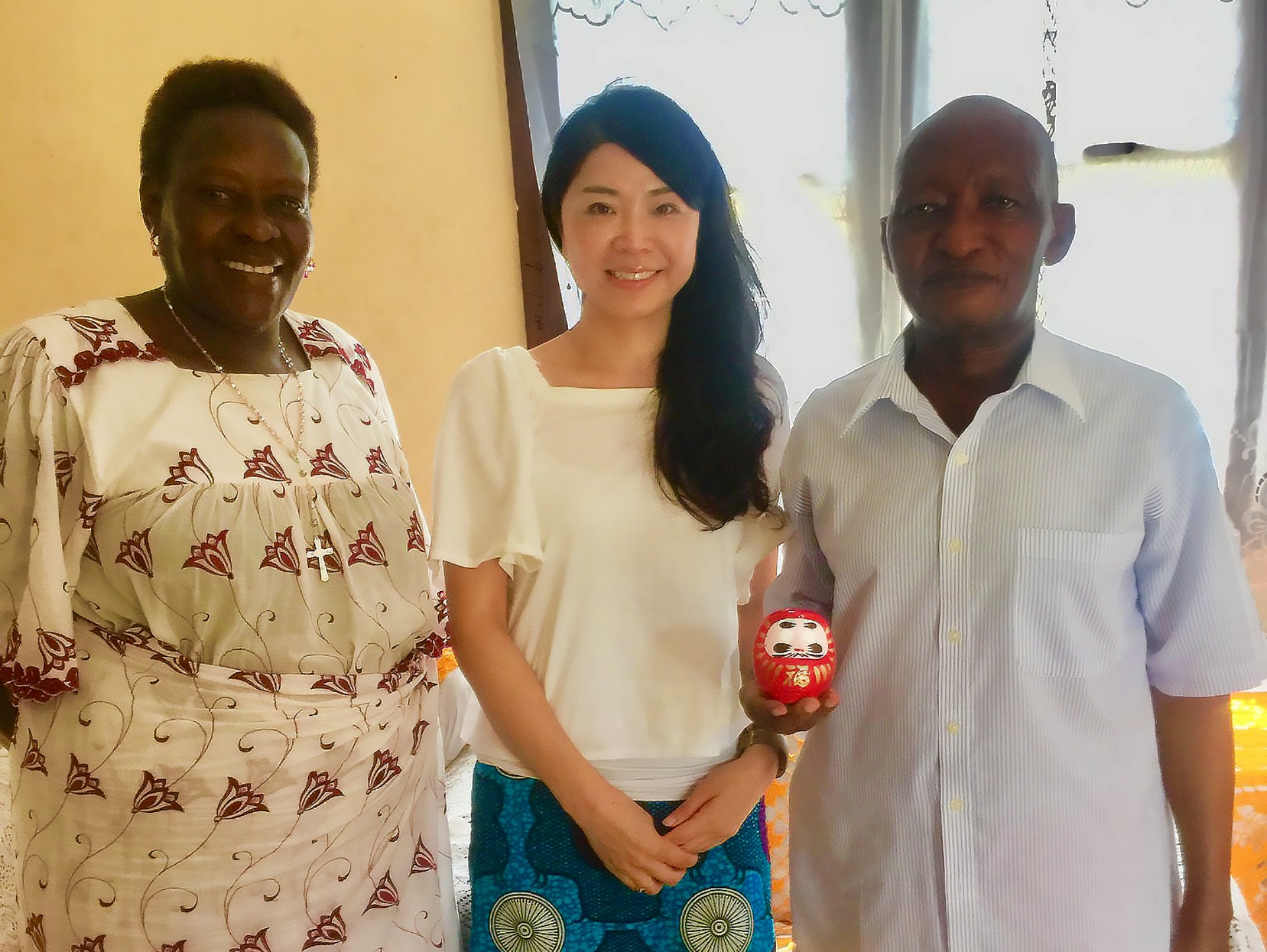Wijers-Hasegawa Yumi

(Athletes entering the venue of the first National Unity Day sports tournament on 16 January 2016, raising the flag of South Sudan/ Photo: Oi Ayako, JICA)
Series : Africa in Focus
In the lead-up to the 9th Tokyo International Conference on African Development (TICAD9) in August 2025, JICA is sharing a series of stories that explore Africa’s challenges and promise. While showcasing JICA’s contributions, the series also brings attention to the broader efforts, ideas and potential across the continent. This instalment focuses on peacebuilding and social stability through sport.
When Furukawa Mitsuaki first arrived in South Sudan, he never imagined his assignment would lead to a breakthrough in the country’s modern history.
What began as a traditional development post for the Japan International Cooperation Agency (JICA) evolved into something unprecedented. Furukawa ended up playing a central role in organising South Sudan’s first National Unity Day (NUD), a groundbreaking sports event, and later helped the country make its Olympic debut in Rio de Janeiro, something no other donor or development agency has yet attempted.
JICA typically focuses on collaborating in development of areas such as infrastructure, agriculture, education and healthcare. That was also Furukawa’s original mission when he became Chief Representative for JICA’s South Sudan office in November 2014.
So why sport?
“South Sudan became the world’s youngest country when it gained independence in July 2011. But the country has been mired in civil conflicts and poverty ever since. People were simply exhausted,” Furukawa explained.
Due to ongoing violence, staff from international organisations were largely confined to the capital, Juba.
“It was dangerous, and probably not permitted, but I started walking around Juba to try to understand people’s daily lives,” he recalled. “Ogata Sadako, former UNHCR chief who became JICA’s President in 2003, always emphasised the importance of understanding people and their living environment. I deeply relate to that.”
South Sudan’s infrastructure had been badly damaged by decades of conflicts. Roads and water systems were in disrepair. Literacy stood at just 27%, and the average life expectancy was under 50.
Yet amidst these challenges, Furukawa noticed something unexpected. The faces of young people playing football on the streets were lit with joy. “They seemed completely absorbed in the game, momentarily free from the hardship around them as they kicked around the ball,” he said. It was then that Furukawa realised that beyond physical reconstruction, what the country desperately needed was support that nurtures hope.
This idea crystalised when he met Edward Settimo Yugu, Director General of South Sudan’s Ministry of Culture, Youth, and Sports. A former basketball player for the National Team, Yugu shared that prior to independence, regional sports days had brought people together, helping bridge deep tribal and ethnic divides.
Roots of the conflict in South Sudan run deep. Under British colonial rule, development was concentrated in the North, fostering long-standing disparities. Following independence from Britain, the North effectively tried to colonise the South, sparking two brutal civil wars that lasted decades and displaced millions.
When South Sudan finally gained independence on 9 July 2011, hopes were high. But peace was short-lived. Barely 29 months later, renewed conflict broke out, causing more than 4 million people to require emergency humanitarian assistance.
Violence continues to be fueled by two overlapping dynamics: inter-ethnic conflict over cattle and political conflict between government and opposition forces. These conflicts are entangled with ethnic identities, particularly between President Salva Kiir (a member of the Dinka tribe) and Vice President Riek Machar (a member of the Nuer tribe), who was reported as put under house arrest in March 2025. Both groups are nomadic, and in their cultures, cattle are not just economic assets. They symbolise social status, tradition, and power. In a society where polygamy is common and a bride's family is paid for losing a member of their household through marriage, owning more cattle means the ability to marry more women, expanding both family size and influence.
Cattle theft, historically seen as a sign of masculinity and not just about acquiring wealth, has become deadlier in the age of automatic weapons. Mistrust between ethnic groups continues to grow, deepening the cycle of violence and instability.
“What the South Sudan of today needs,” Yugu said, calling on the revival of past sports days, “is to call on its people to unite the country through sports in the spirit of fair play, as the country's ongoing conflict requires human connections that transcend state and ethnic boundaries.”
Furukawa agreed, but making it happen was far from easy. He had to convince not only JICA’s Juba office and headquarters in Tokyo, but also the Japanese Embassy and the Ministry of Foreign Affairs. Back then, development through sport was not part of JICA’s Global Agenda, as it is now. It was still an unconventional idea.

(Edward Settimo Yugu, Director General of South Sudan’s Ministry of Culture, Youth, and Sports/ Photo: Furukawa Mitsuaki, JICA)
To build trust and gain the formal approval from the government, Furukawa arranged for South Sudanese officials to visit Japan, where they saw first-hand the country’s meticulous preparations for the Tokyo 2020 Olympics.
Yet logistical hurdles remained. South Sudan had no usable sports facilities. With support from the Japan Self-Defense Forces, stationed in South Sudan as a part of UNPKO forces in the mid-2010s, as well as a Japanese construction company and an architecture firm, stationed to build infrastructure projects financed by JICA, new facilities were built from scratch.
Selecting and transporting athletes posed another challenge. Many feared that travelling to Juba could cost them their lives. But JICA and the South Sudanese government addressed each concern step by step.
In January 2016, the first-ever National Unity Day was held. For a week, 350 male and female athletes from nine cities competed in football, track, and field.
In South Sudan, most tribes live in isolated communities with little contact with others. This lack of interaction fuels suspicion and animosity.
“To build trust, we had athletes from different ethnic groups eat and sleep in the same facility,” Furukawa said. “At first there was tension, so we had staff from the Ministry of Sports on site to help. But over time, friendships began to form. Athletes even helped their opponents up during games.”
As Yugu had hoped, sport became a bridge to bond people across different ethnic divides.
(An athlete raising a trophy during a National Unity Day sports tournament in South Sudan/ Photo: JICA)
Buoyed by the event’s success, JICA set its sights higher and aimed to help South Sudan participate in the 2016 Olympic Games in Rio.
But just one month before the Games, fighting erupted again. Most foreigners, including Japanese staff, had to evacuate.
“I was airlifted to Tokyo to escape from a critical situation. But when I reported my return to JICA President Kitaoka (Shinichi), he asked, ‘So, what is the status with the Olympics?’
I remember thinking, he cannot be serious,” laughed Furukawa, recalling that day. “My car was shot, and I narrowly escaped death. But the President was still asking about South Sudan joining the Olympics. He said: ‘Isn’t it precisely because of the difficult situation that South Sudan should participate in the festival of peace (as the Olympics is sometimes called)?’ I was both astonished and greatly impressed by his endeavour.”
With just three weeks to go, Furukawa and his team operated from Tokyo, coordinating with their local staff in Juba. Against all odds, they managed to send three athletes to Rio, including marathon runner Guor Marial, one of the 'Lost Boys' who had fled the war on foot through North Sudan and Egypt as a small child.
“It was a miracle that JICA could support a brand-new country in its first project for peace,” he said.
Furukawa said he was overwhelmed with emotion watching South Sudan’s flag raised at the Olympic opening ceremony. “It was nothing short of a miracle,” he said. “JICA was part of a historic first for peace.”

(“Lost Boy” Guor Marial in the Rio 2016 Olympic marathon/ Photo: JICA)
Now a university professor, Furukawa has published research showing that national sports events can significantly reduce ethnic prejudice among athletes, encourage mutual respect, and help build social trust in divided societies like South Sudan.
Japan’s success in supporting South Sudan with the NUD and Olympic participation likely stems from its own experiences. These include the annual National Sports Festival (Kokutai), launched in 1946 to inspire hope in the postwar chaos, the Tokyo 1964 Olympics, which symbolised Japan’s recovery, and the Tokyo 2020 Olympics, which presented Japan as a culturally confident and mature nation.
In a separate interview, Yugu spoke warmly of the deep trust South Sudan has built with JICA and the Japanese people.
“We trust JICA and Japan,” he said. “Other organisations left when conflict broke out, but JICA stayed, even after the major fighting in 2016. They always kept their promises.”
Yugu emphasised how JICA’s ongoing support has helped unite South Sudanese communities. He noted how the National Unity Day (NUD) tournaments, eight of which were held between 2016 and 2024, became a symbol of that unity. When the 2025 edition wasn’t held, many began to ask about the “JICA tournament” - the affectionate name locals use for the NUDs.
“We’ve been approached by other countries to co-organise NUD,” he added. “But we said no. We want to work with JICA.”
Ito Miwa from JICA’s Head Office played a key role in the early research and planning for South Sudan’s National Unity Day. After her time there, she was posted to Tanzania.
Inspired by the success of NUD, Ito began thinking about how sport could be used in Tanzania as well. But unlike South Sudan, Tanzania was a peaceful country. The concept of “Sports and Peace” didn’t quite apply.
Looking for a theme that resonated locally, she spoke with Juma Ikangaa, a legendary Tanzanian marathon runner. He suggested focusing on ‘sport and gender’.
Ito agreed, noting that many women have great athletic potential, but they are rarely given the same chance as men. In her view, sport mirrored the broader inequalities that women face across society.

(JICA’s Ito Miwa with Tanzanian marathon icon Juma Ikangaa, known as the “African Star”, and his wife, Catherine Nyamko/ Photo: Ito Miwa, JICA)
Taking this to heart, Ito launched “Ladies First,” a women-only athletic tournament that quickly became a yearly event with over 200 participants.
“In a country where some girls are forbidden by their families to play sports, little girls in the audience were shouting, ‘Look! A girl is running! She’s so fast!’” Ito recalled.
“Ladies First” followed official competition standards, giving top performers a real shot at international opportunities. In fact, two women who competed in the tournament went on to run in the Paris 2024 Olympic marathon.
“It’s incredibly motivating for young girls to see that their efforts can change their lives,” said Ito.
To create a safe and empowering environment for girls, Ito believed it was important to address the realities they face beyond the playing field. This led to a focus on the intersection of sport and gender, highlighting how sport can be a powerful platform for raising awareness and driving change, particularly in tackling the serious issue of unwanted teenage pregnancy.
In Tanzania, abortion is illegal, yet sexual violence is a widespread problem. Many children walk for hours through mountains to reach school. Some girls, unaware of the risks during these long walks, accept small sums of money or favors from men who expect something in return. These already tragic incidents often lead to pregnancy. Families, feeling shame, sometimes expel their daughters from home or give them illegal abortion pills that can be fatal.
To raise awareness and prevent such tragedies, Ito partnered with a local NGO to create plays. In Tanzanian culture, theatre is a widely used and effective way to deliver important messages. The plays were performed between the tournament events and were attended by students, teachers and healthcare workers.
“Sport events are the perfect setting to talk about these issues,” said Ito. “In topics like gender, culture, religion, or customs can sometimes present barriers. But sport has the power to overcome this.”




scroll